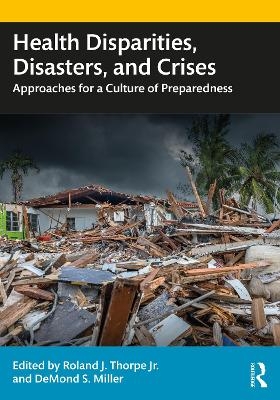
Health Disparities, Disasters, and Crises
Routledge (Verlag)
978-0-367-67731-2 (ISBN)
Health Disparities, Disasters, and Crises: Approaches for a Culture of Preparedness presents a roadmap to help guide the actions needed to address health disparities introduced as part of the pre-planning, planning, and mitigation phases of natural and technological disasters.
With contributions from 30 scholars in disaster management in public health, this text explores how the intersectionality of health disparities of different socioeconomic and racial/ethnic groups and how social determinants help shape exposure, and vulnerability to pandemic disasters and crises. Supported by examples from across the world, chapters are supplemented with case studies of best practices, graphs, and tables. Each of the seven parts address different topics, including how disasters affect the poor, medically underserved, and racial/ethnic groups, the impact of health disparities, and the growing link between global health, disaster planning/mitigation, and global security.
Written for the benefit of undergraduate and graduate students, working professionals, and academics in the US and abroad, Health Disparities, Disasters, and Crises: Approaches for a Culture of Preparedness provides the best overall understanding of professional disaster management and safety for all citizens. It is also an ideal text for graduate and undergraduate courses in public health, public policy, medicine and nursing, healthcare administration, emergency management, emergency preparedness, homeland security, epidemiology, sociology, and medical sociology.
Roland J. Thorpe Jr. holds joint appointments in medicine and neurology at the Johns Hopkins University School of Medicine. He is an Associate Professor of Health, Behavior and Society at the Johns Hopkins Bloomberg School of Public Health. He serves as the Director of the Program for Research on Men’s Health at the Hopkins Center for Health Disparities Solutions. Dr. Thorpe’s research focuses on racial and socioeconomic health disparities, particularly among US men. DeMond S. Miller is a Professor of Sociology, Professor of Disaster Science and Emergency Management, and coordinates the Program in Healthcare Management and Administration. He serves as the Program Director in Disaster Science and Emergency Management. Dr. Miller’s primary areas of research specialization are environmental sociology (disaster studies), sustainable disaster recovery, disaster equity studies, emergency services and response, community development, community-based research, technological disasters, international irregular migration, and acts of terror as disasters.
Chapter 1. Health, Inequalities, and Building a Culture of Preparedness; Chapter 2. Inclusive Preparedness and Emergency Response for Disasters Yet to Come; Chapter 3. Racialized Healthcare Inequities as Determinant of COVID-19 Disaster Risks and Outcomes: Moving Towards COVID-19 Disaster Recovery; Chapter 4. Partnering with Black Organizations to Deliver Vaccine Education in Black Communities; Chapter 5. Towards re-enforcing resilience in crisis: African American family voices during the COVID-19 pandemic; Chapter 6. Understanding How Disasters Worsen Disparities in Non-Communicable Diseases; Chapter 7. Preparedness for Pandemic Disasters to Come; Chapter 8. Cross-National Newspaper Coverage of Climate Change: Community Structure Theory and “Buffered” Health and Female Privilege; Chapter 9. Disaster Response Inclusiveness to Persons with Disabilities and the Elderly in the Philippines; Chapter 10. Gender Dimension of Disasters in Africa: Building a Gender Inclusive Culture of Preparedness; Chapter 11. Pre-existing sociodemographic and health characteristics and trends in confirmed COVID-19 cases in Louisiana; Chapter 12. Social Inequality, COVID-19, and the Delta Wave: Intersections of Race, Gender, and Education; Chapter 13. Convergence of COVID-19 Pandemic Disaster, Mental Health, and Substance Use Disorder; Chapter 14. How Deliberate Planning and Improvisation Shaped Our Response to COVID-19; Chapter 15. Lessons Learned and Moving Forward from Hurricane Katrina: Emergency Response Planning to Build an Inclusive Response Framework; Chapter 16. Health Disparities and Promoting a Culture of Preparedness: Building Resilience and Tangible Trust in an Age of Disasters; Index
| Erscheinungsdatum | 03.01.2024 |
|---|---|
| Zusatzinfo | 16 Tables, black and white; 4 Line drawings, black and white; 8 Halftones, black and white; 12 Illustrations, black and white |
| Verlagsort | London |
| Sprache | englisch |
| Maße | 178 x 254 mm |
| Gewicht | 576 g |
| Themenwelt | Sachbuch/Ratgeber ► Gesundheit / Leben / Psychologie |
| Medizin / Pharmazie ► Gesundheitswesen | |
| Medizin / Pharmazie ► Pflege | |
| Naturwissenschaften ► Biologie ► Ökologie / Naturschutz | |
| Naturwissenschaften ► Geowissenschaften ► Geografie / Kartografie | |
| ISBN-10 | 0-367-67731-8 / 0367677318 |
| ISBN-13 | 978-0-367-67731-2 / 9780367677312 |
| Zustand | Neuware |
| Haben Sie eine Frage zum Produkt? |
aus dem Bereich


